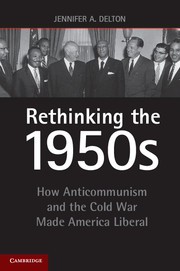6 - Eisenhower’s Liberal Legacy
Published online by Cambridge University Press: 05 October 2013
Summary
In his book about the origins of the national security state, historian Michael Hogan sums up a common view of the Cold War’s effect on liberalism:
Liberals had assumed that national security would add legitimacy to their notions of an activist state and justify a more aggressive role for the government in promoting the general welfare, as well as common defense. This was not the case, however, at least in the 1950s, when the economic burden of defense put serious limits on the expansion of the social-welfare programs and gave conservatives a powerful weapon they could use to halt the forward march of the New Deal.
Eisenhower’s legislative achievements, however, suggest not only that the New Deal did march forward in the 1950s but also that national security did legitimate notions of an activist state and did justify a more aggressive role for government in promoting social welfare. Eisenhower was conservative in his demeanor and rhetoric but what he fought for, the decisions he made, and the policies he supported furthered the liberal agenda and continued a New Deal way of thinking. And when conservatives in his party or the public in general objected, Eisenhower was able to justify his policies in terms of national defense. Eisenhower was, of course, fully committed to the Cold War. But he also believed – like most liberals – that public spending could even out the “peaks and valleys” of economic life and that the federal government had some responsibility for the health and welfare of its citizens.
- Type
- Chapter
- Information
- Rethinking the 1950sHow Anticommunism and the Cold War Made America Liberal, pp. 121 - 152Publisher: Cambridge University PressPrint publication year: 2013



